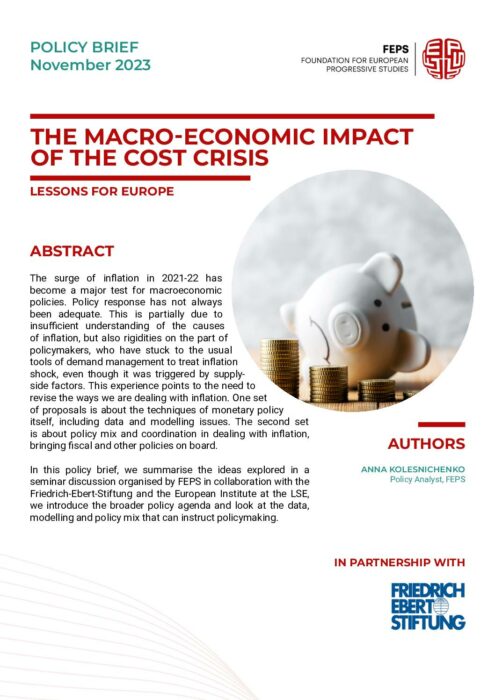In the aftermath of the sovereign debt crisis, the architecture of economic and financial governance in the European Union changed at an unprecedented pace. Member States have put in place crucial pillars of the Banking Union and the Capital Markets Union.
Nevertheless, progress on both projects has slowed down. As the new European Commission takes office, the work towards reforming the Economic and Monetary Union will likely revive. Agreed plans to attain banking and financial integration have not yet been completed; plus additional institutional and policy arrangements could become handy to contain systemic risk, shall a new crisis hit European markets
FEPS, in partnership with the University of the West of England – Bristol, the Rockslide University and the Financial Markets Group at the London School of Economics, organised on the 11th September on a conference titled “De-risking the Future of Europe”, held at the LSE. The publications published afther these discussions intend to shed some light on this relevant debate. These four papers set forward a balanced appraisal of the development of the EU’s Economic and Monetary Union and, crucially, the authors elucidate avenues for future reform.
Jakob Vestergaard and Daniela Gabor co-author three policy briefs in which they spell out their vision on how collateral policies should be implemented differently by the ECB. They argue against the ECB’s involvement in the fiscal disciplining of EU member states through collateral policies. In their view, disciplinary central banking along such lines would be destabilising, economically as well as politically. Instead, the authors posit that collateral policies should be unequivocally non-discriminatory and countercyclical if the ECB is to play market-maker of last resort role in times of crisis. Furthermore, in light of the financial shock brought about by the Covid-19 pandemic, the authors call for the ECB to temporary suspend its practices of haircut differentiation and daily margin calls.
Read the Policy Briefs:
Should Central Banks Discipline Governments
Confronting ECB’ Austerity Mandate
Collateral Easing with Disciplinary Dysfunction
In a similar vein, Gabor identifies three pillars of a progressive approach to greening the European financial system: ensure stricter identification of green vs brown financial products, climate-align the ECB and impose a green FTT.
Read Greening the European Financial System
Vestergaard is joined by Stine Quorning in analysing the existing supervision mechanisms within the EU’s banking union. The authors warn that the omission of shadow banking from the supervision mandate given to the Single Supervisory Mechanism (SSM) must be rectified. They urge policymakers to expand the mandate of the SSM to include shadow banking institutions in its supervision. Furthermore, the authors propose upgrading the mandate of the European Systemic Risk Board from monitoring to supervision as well as the establishment of a European Financial Supervision Authority.
Read Establishing a European Supervision
Aitor Erce, on the other hand, reviews the existing process leading to sovereign debt restructuring and identifies several aspects that limit its effectiveness and credibility. Erce suggests that the process should be reformed in order to incorporate more accurate technical tools and a more transparent governance framework, one that separates technical from political decisions.
Read Sovereign Debt Restructuring in the Euro Area














